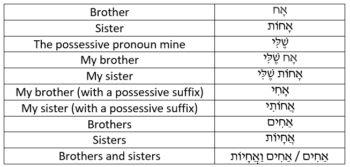Hebrew Family Vocabulary: Part 2 Posted by Ayana on Apr 28, 2021 in Vocabulary
In Part 1 we’ve learned all the words for parents. Today we will learn the words for siblings.
The Hebrew word for brother, either younger or older, is אָח, pronounced as ach.
The Hebrew word for sister, either younger or older, is אָחוֹת, pronounced as a-chot.

For example:
יֵשׁ לׅי אָח אֶחָד.
I have one brother.
יֵשׁ לׅי אָחוֹת שֶׁגְּדוֹלָה מִמֶּנִי בְּחָמֵשׁ שָׁנִים.
I have a sister who is five years older than me.
זֶה אָח שֶׁל דָּוִד.
This is David’s brother.
אָחוֹת שֶׁלִּי בָּאָה לְבַקֵּר אוֹתִי.
My sister came to visit me.
אָח שֶׁלּוֹ גָּר בחו”ל.
His brother lives abroad.
Usually, when talking about my sister or my brother, Israelis use a possessive suffix instead of the possessive word my (שֶׁלִּי). Every Hebrew noun can be declined with a possessive suffix; הַמִּשְׁפָּחָה שֶׁלִּי (my family), for example, has the same meaning of מׅשְׁפַּחְתּׅי.
הַבַּיִת שֶׁלִּי (my home), for another example, has the same meaning of בֵּיתִי. The only difference is the usage of the possessive phrase. Although every Hebrew noun can be declined with a possessive suffix, in spoken Hebrew, though, you rarely hear someone use these suffixes. When talking about one’s objects, the possessive word שֶׁלִּי (my), is usually used. Mentioning one’s own siblings, on the other hand, is different. The usage of a possessive suffix with the words brother and sister is fairly prevalent. אָחִי (my brother) and אֲחוֹתִי (my sister) are very common in daily spoken Hebrew.
For example:
זוֺ אֲחוֹתִי.
This is my sister.
אָחִי בֵּן עֶשְׂרִים.
My brother is twenty years old.
אֲחוֹתִי חוֹגֶגֶת הַיּוֹם יוֹם הֻלֶּדֶת.
My sister is celebrating her birthday today.
אָחִי הַקָּטָן סִפֵּר לׅי.
My little brother told me.
אֲחוֹתִי בָּאָה לְבַקֵּר אוֹתִי.
My sister came to visit me.
לְאָחִי יֵשׁ שְׁנֵי יְלָדִים.
My brother has two children.
These two words are also very common in Hebrew slang, for addressing males or females. There are many ways to address someone: by his name, by his surname, by his nickname, or by a formal title. To express affection when addressing someone close to you, many Israeli youngsters choose the Hebrew nouns for brother and sister combined with a possessive suffix. It can be translated as bro, or sis, and can refer to anyone close to the speaker: a friend, a relative, a colleague, a neighbor. These informal methods of addressing can even refer to a stranger, at the same age of the speaker or younger, when the speaker wishes to express a closeness, or an empathy.
For example:
אָחִי, תּוֹדָה עַל הָעֶזְרָה.
Thanks for the help, bro.
יָא אֲחוֹתִי, אֲנִי שְׂמֵחָה שֶׁבָּאת.
Yo, sis, I’m glad you came.
אָחִי, אַתָּה לֺא מֵבִין מָה קָרָה.
Dude, you do not understand what happened.
אֲחוֹתִי, אַתְּ מַמָּשׁ מַגְזִימָה.
Sis, you are overreacting.
Both nouns decline to plural in accordance to their grammatical gender without exception:

For example:
יֵשׁ לׅי שְׁנֵי אַחׅים: אָח קָטָן וְאָח גָּדוֹל.
I have two brothers: younger brother and older brother.
לְדָּוִד יֵשׁ אַרְבַּע אֲחָיוֹת גְּדוֹלוֹת.
David has four older sisters.
גַּם הָאַחׅים שֶׁלִּי מַרְכִּיבִים מִשְׁקָפַיִם.
My brothers also wear glasses.
הָאֲחָיוֹת שֶׁלִּי גְּבוֹהוֹת מִמֶּנִי.
My sisters are taller than me.
In Hebrew, the masculine plural form of any noun refers to two kind of groups. It can refer to a group that consists of masculine singles only. For example: the boys (הַבָּנׅים). It can also refer to a mixed group of males and females. For example: the children (הַיְּלָדׅים), boys and girls. A feminine plural form, on the other hand, refers to a group consisting of females only. אֲחָיוֹת (sisters), hence, refers to sisters only, while אַחׅים (brothers) can refer to brothers only, or sisters and brothers together. Therefore, the plural form אַחׅים (brothers) refers to all the speaker’s brothers and sisters, but if he still wishes to clearly mention both he can say: אַחׅים וַאֲחָיוֹת (brothers and sisters).
Review the chart below that summarizes all the new vocabulary:

Keep Calm and Learn Hebrew

Build vocabulary, practice pronunciation, and more with Transparent Language Online. Available anytime, anywhere, on any device.




